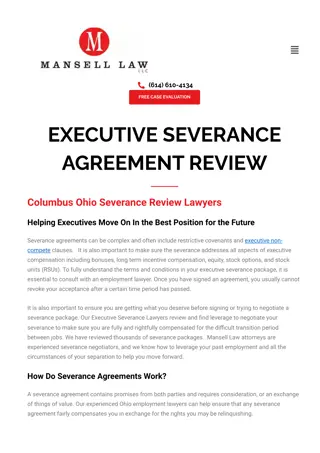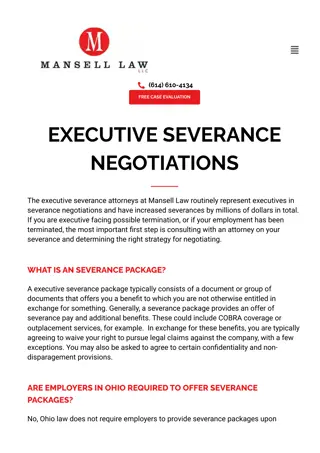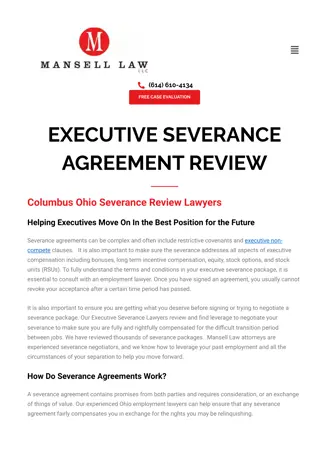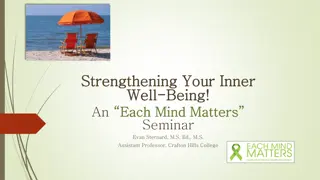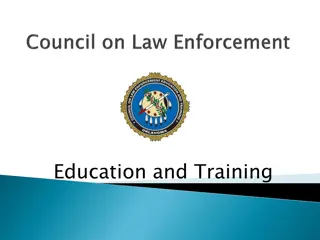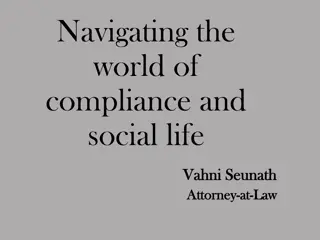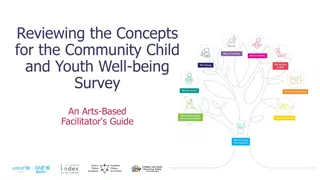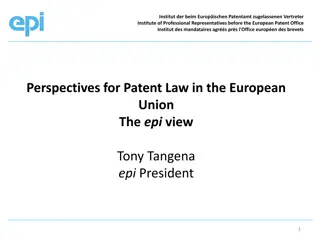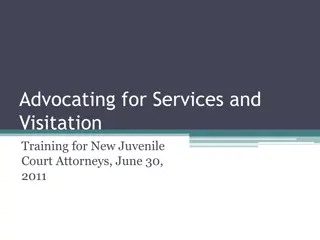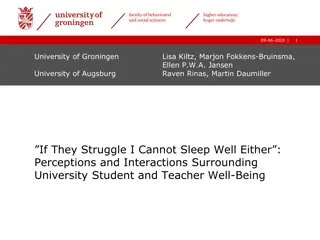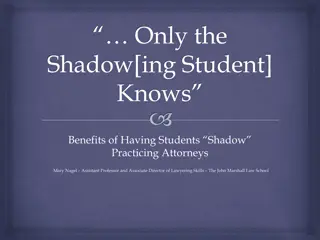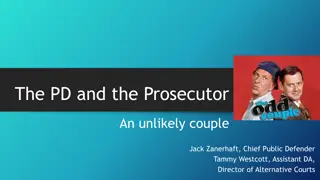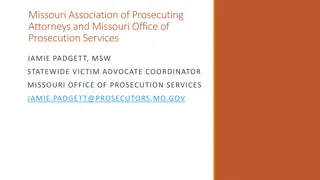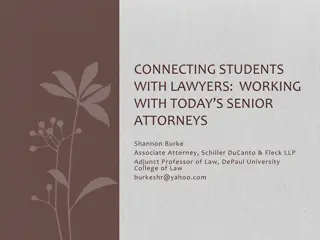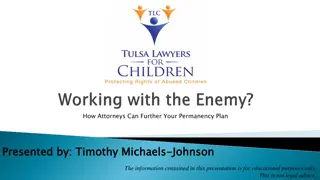Insights into Challenges Faced by Attorneys and Their Well-being
Attorneys face significant challenges such as balancing work and family, coping with high levels of stress, and limited vacation time. The legal profession is perceived as becoming less desirable by many attorneys, yet a majority remain satisfied with their careers. These insights shed light on the mental health and work-life balance issues prevalent in the legal field.
Download Presentation

Please find below an Image/Link to download the presentation.
The content on the website is provided AS IS for your information and personal use only. It may not be sold, licensed, or shared on other websites without obtaining consent from the author. Download presentation by click this link. If you encounter any issues during the download, it is possible that the publisher has removed the file from their server.
E N D
Presentation Transcript
Attorney Mental Health
92% of attorneys list balancing family and work (41%) and high stress (38%) as significant challenges/concerns they face as an attorney. Compared to the 2015 survey, these two challenges/concerns increased 9% and 7%, respectively. This is an increase of 5% from 2013. How much stress do you experience in the practice of law? o Some stress o A great deal of stress o Very little or no stress
Approximately two-fifths of attorneys feel balancing family and work (41%) and high stress (38%) as significant challenges/concerns they face as an attorney. Compared to the 2015 survey, these two concerns increased by 9% and 7%, respectively. What is the most significant challenge or concern you personally face as an attorney? o Balancing family and work o High stress o Time management o Client expectations o Billable hours o Lack of business o Other
63% of attorneys took two weeks or less of vacation in 2019. Approximately one-third only took one week or less. How many weeks of vacation did you take last year? o No vacation taken o Less than 1 week o 1 week o 2 weeks o 3 weeks o 4 weeks o More than 4 weeks
The primary reason attorneys did not take more vacation in 2019 was time constraints. What was the primary reason you did not take more vacation time o Time constraints o Did not feel the need to/satisfied with amount taken o Financial limitations o Pressure from employer o Pressure from clients o Family scheduling problems
Nearly 75% of attorneys feel that the legal profession, as a career, is becoming somewhat less desirable (52%) or much less desirable (22%). In general, do you feel that the legal profession, as a career, is becoming o Much more desirable o Somewhat more desirable o Staying about the same o Somewhat less desirable o Much less desirable
Over three-quarters of attorneys are satisfied with their legal career. I am satisfied with my legal career. Agree Neither agree nor disagree Disagree o
Attorneys level of satisfaction increased with age. 73% of attorneys 35 years of age or younger were satisfied with their legal career, compared to 83% of those over 65 years of age.
Two-thirds of (67%) attorneys agree that their work and personal life has good balance, compared to nearly one-quarter who (23%) who disagree. My work and personal life has good balance. Agree Neither agree nor disagree Disagree o
Again, attorneys work/life balance got better with age. Only 58% of attorneys age 35 years or younger agreed that their work and personal life has good balance, compared to 83% of attorneys over the age of 65.
The following statistics are some from the Florida Lawyers Assistance website https://www.fla-lap.org/ 32% of attorneys under the age of 30 have a problem with alcohol and substance abuse. 28% of attorneys struggle with some level of depression. 19% of attorneys demonstrate symptoms of stress and anxiety. 11% of lawyers have had suicidal thoughts at some point in their career.
Common effects of stress On your body On your mood On your behavior Headache Anxiety Overeating or undereating Muscle tension or pain Restlessness Angry outbursts Chest pain Lack of motivation or focus Drug or alcohol misuse Fatigue Feeling overwhelmed Tobacco use Change in sex drive Irritability or anger Social withdrawal Stomach upset Sadness or depression Exercising less often Sleep problems
Act to manage stress If you have stress symptoms, taking steps to manage your stress can have many health benefits. Explore stress management strategies, such as: Getting regular physical activity Practicing relaxation techniques, such as deep breathing, meditation, yoga, tai chi or massage Keeping a sense of humor Spending time with family and friends Setting aside time for hobbies, such as reading a book or listening to music Aim to find active ways to manage your stress. Inactive ways to manage stress such as watching television, surfing the internet or playing video games may seem relaxing, but they may increase your stress over the long term. And be sure to get plenty of sleep and eat a healthy, balanced diet. Avoid tobacco use, excess caffeine and alcohol, and the use of illegal substances.
What is Compassion Fatigue? Compassion fatigue is the cumulative physical, emotional and psychological effect of exposure to traumatic stories or events when working in a helping capacity, combined with the strain and stress of everyday life. It s important to note that compassion fatigue is different than burnout. While burnout is predictable, building over time and resulting in work dissatisfaction, compassion fatigue has a narrower focus. Someone affected by compassion fatigue may be harmed by the work they do, experiencing intrusive imagery and a change in world-view. Compassion fatigue is also known as vicarious trauma, secondary traumatic stress, second hand shock and secondary stress reaction. Regardless of the term used, compassion fatigue affects those in the helping professions, including the legal profession, and is treatable. Treatment of compassion fatigue may prevent the development of a more serious disorder.
Symptoms of Compassion Fatigue Perceiving the resources and support available for work as chronically outweighed by the demands Having client/work demands regularly encroach on personal time Feeling overwhelmed and physically and emotionally exhausted Having disturbing images from cases intrude into thoughts and dreams Becoming pessimistic, cynical, irritable, and prone to anger Viewing the world as inherently dangerous, and becoming increasingly vigilant about personal and family safety Becoming emotionally detached and numb in professional and personal life; experiencing increased problems in personal relationships Withdrawing socially and becoming emotionally disconnected from others Becoming demoralized and questioning one s professional competence and effectiveness Secretive self-medication/addiction (alcohol, drugs, work, sex, food, gambling, etc.) Becoming less productive and effective professionally and personally
Treatment of Compassion Fatigue There are ways to mitigate compassion fatigue. Awareness. Understand what compassion fatigue is and periodically self-assess for it. Debriefing. Talk regularly with another practitioner who understands and is supportive. This involves talking about the traumatic material, how you think and feel about it, and how you are personally affected by it. Self-care. Proactively develop a program of self-care that is effective for you. This includes healthy eating, exercising regularly, getting adequate rest, and learning how to turn off the fight-or-flight response of your sympathetic nervous system and turn on the relaxation response of your parasympathetic nervous system. Balance and Relationships. Take steps to simplify, do less, ask for help, and stop trying to be all things to all people, including your clients. Start thinking about how you can work on balance rather than the reasons you can t. Working to develop and maintain healthy interpersonal relationships will also increase your resilience. Professional Assistance. Treatment from a licensed provider specializing in trauma may be beneficial. Being Intentional. If you are overwhelmed and struggling with depression, anxiety, substance abuse, or compassion fatigue, put a plan for change in place. Recognize that the attributes that contribute to your professional success (e.g., motivated, perfectionistic, achievement-oriented, driven, fixer) and your work environment may be contributing to an imbalance in your life. Monitor your thoughts, emotions, and behaviors. Seek assistance to help you implement change and redirect the thoughts that tell you, I should be able to do this by myself. Your new mantra can become, I don t have to do it all by myself.
How Compassion Fatigue Affects Lawyers Lawyers, like others in the helping professions, are at risk for experiencing compassion fatigue. Lawyers in certain practice areas, such as criminal, family or juvenile law may be especially susceptible to compassion fatigue, as they are regularly exposed to human-induced trauma, and are called on to empathetically listen to victims stories, read reports and descriptions of traumatic events, view crime or accident scenes, and view graphic evidence of traumatic victimization. Those with high caseloads and those with a high capacity for empathy are also at risk for experiencing compassion fatigue. Lawyer assistance programs (LAPs) are here to support lawyers, judges, students and other legal professionals who experience compassion fatigue. Contact your state or local LAP.
How to Help a Colleague Affected by Compassion Fatigue If you believe a colleague may be experiencing compassion fatigue, encourage him/her to seek help. Contact a LAP for additional support and resources.
Sometimes, taking a vacation, staycation, or learning a new skill can help you manage your stress:
Stay-Cation Ideas: Rent Paddle Boards and paddle through downtown Tampa https://www.urbankai.com/ In Home Yoga with Kodawari Yoga (instructors can come to your home) https://kodawariyoga.com/ Taco Tuesday in Home with Bar Taco https://order.bartaco.com/menu/bartaco-hyde-park
Develop a New Skill through MasterClass: https://www.masterclass.com/ Gardening, Dog Training, Basketball with Stephen Curry , Cooking with Gordon Ramsay
CURRICULUM VITA SCOTT M. WEINSTEIN, Ph. D. 2335 East Atlantic Blvd., Suite 410 Pompano Beach, Florida 33062 Mobile: (954) 818-0888 Office: (954) 566-9040 Professional Licenses Psychologist Florida License Number PY4789 Education 1990 University of Miami Coral Gables, Florida Ph.D. Counseling Psychology 1983 North Texas State University 1984 Denton, Texas M.S. Counseling Psychology 1981 University of Florida Gainesville, Florida B.A. Psychology Professional Experience June 2004 Present Clinical Director, Florida Lawyers Assistance, Inc., Pompano Beach, FL Monitor psychological services provided to attorneys under therapeutic rehabilitation contract. Clinical consultation with FLA-approved therapists throughout Florida Provide group therapy with attorneys under contract with FLA. 2001 2004 Private Practice, Psychological Associates, Weston, FL Clinical focus on children, adolescents, and families. Individual and family therapy Psychological assessment and treatment planning
Professional Experience October 2004 May 2005 Clinical Psychologist, Outpatient Services, Broward Addiction Recovery Center (BARC), Ft. Lauderdale, FL Clinical and administrative direction of Broward County Substance Abuse Programs. 2001 Director of Cognitive Medical Services, Orthopaedic Associates, Plantation, FL Clinical direction and supervision of licensed and unlicensed staff. Pain management, bio-feedback training, individual psychotherapy. Liaison with Orthopedic Specialty Physicians. Established policies and procedures for clinical and administration staff. Developed guidelines for practicum program site with Nova Southeastern University 1998 - 2001 Private Sole Practice, Private practice: Child, Adolescent, Family, Adult Individual, group, and family therapy Psychological assessment Plantation, Florida 1988 - 1998 President/Director, Progressive Family Care, Plantation, FL Owned and managed a comprehensive outpatient psychological program focusing on the evaluation and treatment of the geriatric population in long term care. Set policies and procedures for PFC personnel.Clinical direction and supervision of licensed staff.Supervision of externship for Nova Southeastern Psy.D. Students. Developed and implemented training programs. 1993 (Summer) Adjunct Professor - School of Occupational Therapy, Barry University, Miami, FL Course on group process and dynamics.
Professional Experience 1989 1992 Family Therapist/Consultant, Children/Infant s Diagnostic Center, Margate, Florida Worked with Jose Birriel, MD, Robin Nemery, MD, Larry Adams, MD, Steven Iskowitz, MD, and Michael Freundlich, MD (Areas of focus included, juvenile diabetes, cystic fibrosis, asthma, irritable bowel syndrome, colitis, obesity, renal disease, and cardiac anomalies) Interfaced with physicians to provide comprehensive course of treatment. Individual and family psychotherapy with chronically and terminally ill children and families. 1988 - 1989 Staff Psychotherapist, Dade Psychiatric Associates, Miami, FL Individual psychotherapy with children and adolescents; family therapy; marital therapy; diagnostic evaluations. 1987 - 1988 Lead Therapist - Pediatric Psychiatry Unit, Charter Hospital, Miami, FL Milieu management; group psychotherapy; multiple family therapy; supervision; treatment planning; program development. 1986 - 1987 Psychology Internship, Regional Institute for Children/Adolescents, Rockville, MD Individual and group psychotherapy; family therapy; psycho diagnostic evaluations; case management. 1986 - 1987 Psychology Internship, Georgetown University Hospital, Department of Psychiatry, Washington, DC Individual psychotherapy; family therapy; psychiatric evaluations; family diagnostic work-ups. 1985-1986 Family Therapist, Village South, Inc., Miami, FL Family, individual, and group psychotherapy with adolescent and adult substance abusers; diagnostic evaluations; consultation; staff supervision and training; program development.
Additional Professional Activities 1992 - 1994 Psychological Consultant, David Posnak Jewish Community Center, Davie, FL Group facilitator for single-parent support group and singles support group. 1989 - 1992 Psychological Consultant, Parent to Parent, Inc., Miami/Fort Lauderdale, FL A support and education organization for families with special needs children. 1989 - 1993 Psychological Consultant, Coral Springs Medical Center, Juvenile Diabetes Program, Coral Springs, FL Worked with Robin Nemery, MD to develop comprehensive approach to Juvenile Diabetic treatment Multi-family group facilitation. 1989 - 1991 Psychological Consultant, Parents of Near Drowning, Inc., Sunrise, FL A support and prevention organization sensitive to the needs and concerns of families of near drowning victims. 1989 - 1991 Psychological Consultant, Tender Care Center, Inc., Fort Lauderdale, FL Pediatric extended care facility. Diagnostic evaluations; individual psychotherapy; program development; training workshops on the psychological treatment of medically involved children and families; family therapy.
Presentations and Publications Mental Health Issues Affecting Lawyers, The Florida Bar s 2017 Diversity Symposium, Pathway to Inclusion. (November 2017) Stress, Mental Health, and Unhealthy Behavior in a Legal Community Miami-Dade County Probate & Guardianship Committee,. (September 2017) Lawyers Under Pressure, Florida Bar News (September 2016) Finding a Ray of Sunshine Through a Dark Cloud, Florida Bar News (March 2015) Stress, Chemical Dependency, and Attorney Satisfaction, Florida Bar Seminar - Practicing with Professionalism (2011 - 2014) What Lawyers Need to Know About Suicide (Especially During A Recession). Florida Lawyers Assistance, Inc. 22nd Annual Workshop - Substance Abuse and Mental Health Issues For Lawyers (2009) A Broader Brush: FLA s Expansion of Services to Assist Lawyers in Need. Florida Lawyers Assistance, Inc. 22nd Annual Workshop - Professionalism and Balance For Lawyers Naples, Florida (2008) Compassion Fatigue in the Legal Profession, Florida Death Penalty Conference Orlando, Florida (2007) Psychological Components of Work-Related Trauma, Park Place Orthopaedics and Rehabilitation (2001) Signs and Symptoms of Depression in the Elderly, North Broward Hospital District (2000) Psychological Issues Surrounding Medication Non-compliance, Hospice/HomeCare By the Sea (1998) Psychological Issues Surrounding Medication Non-compliance, Flagship Home Health, Inc. (1998) Psychological Aspects in the Care of the Geriatric Rehabilitation Patient, Regents Park Nursing and Rehabilitation Center (1997) Psychological Implications of Acute Injury/Illness in the Geriatric Rehab Patient, Sunrise Health and Rehabilitation Center, Regents
Presentations and Publications Park Nursing Home (1997) Psychological Indicators of Depression in the Elderly, Harbour Beach Nursing Center, Atlantis Rehabilitation Center, Lakeside Health Center (1996) Psychosocial Needs of the Elderly, Lake Worth Heath Center, Manor Care of Plantation, Heartland Healthcare Center of Boca (1995) Sensitivity to the Needs of the Elderly, The Palace at Kendall, Heartland Healthcare Center of Lauderhill, Abbey Manor (1994) Identifying and Treating Anxiety in the Elderly, North Shore Nursing Home, Forest Trace at Inverrary, Avante Nursing Home (1993) Normal Aging, Claridge House Nursing Home, Miami Gardens Care Center, Hillhaven Convalescent Center of Delray (1992) Bridging the Gap: A Family Affair, Florida Health Care Social Worker s Association, Annual Convention, Marco Island, Florida (1992) Parenting the Diabetic Child, Coral Springs Medical Center (1991) A Systemic View of the Chronically Ill Pediatric Patient and Family: Psychosocial Assessment and Strategies for Intervention, Coral Springs Medical Center (1991) Psychosocial Assessment and Intervention in Skilled Nursing Facilities, South Florida Health Care Administrators Association (1991) Chronic Illness in Children: Impact on and Support of Families, Third Annual CIDC Pediatric Symposium (1990) Medical and Ethical Issues in Pediatric Organ Transplantation, Second Annual CIDC Pediatric Symposium (1989) Weinstein, S. M. Validation of the Behavior Exchange Inventory (BEI) and the Spousal Inventory of Desired Changes and Relationship Barriers (SIDCARB). Doctoral Dissertation. (1990) Weinstein, S. M. The Development of Self-Focused Attention in Children. Unpublished senior thesis. (1981)










